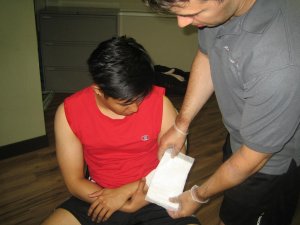Fact Checked
[/sg_popup]Overview – What Does Severe Bleeding Mean?
- Severe bleeding occurs when the casualty loses a substantial amount of blood
- This might occur externally through normal openings, like the ears or mouth
- An abrasion on the skin can also result in bleeding
- Bleeding internally happens due to a wound or a burst blood vessel.
What Are The Causes Of Severe Bleeding?
- Accidents or by falling
- Knock to the head
- Wounds, like scalp injuries
- Tooth removal
- Particular prescriptions
- Disorders like
a. Hemophilia
b. Scurvy
c. Melanoma
d. ThrombocytopeniaSevere bleeding occurs when the casualty loses a substantial amount of blood e. Anemia
f. Leukemia
g. Depletion of blood
h. Intestinal Ulcer
i. Disorder with the platelets
j. Problems with the liver
k. Septicemia
Symptoms
- Release of blood from an injury
- Severe bruising
- Blood contained in the urine/stool
- Blood seeping from other areas, such as the ear or mouth
Treatment For Severe Bleeding
- Wash hands well before managing to casualty
- Use synthetic gloves
- Ensure the casualty is lying down
- Raise the legs slightly
- Examine the affected area and try to elevate that region
- Get rid of any noticeable fragments in the skin or surrounding the wound
- Apply direct force by means of an uncontaminated cloth/dressing
- Use your hand if material is not available
- Apply pressure constantly for at least 25 minutes
- Do not take away the cloth to examine the bleeding
- Hold the dressing in place using an adhesive tape
- If bleeding oozes through the dressing, do not get rid of it
- Add an additional dressing on top of the first one
- Apply direct force on the vein if required
- The pressure points for the arm are situated underneath the arm
- For the leg, the pressure points are situated behind the knee or near the groin
- Squeeze the vein while keeping your finger flat
- Continue applying force on the injury
- Once the bleeding discontinues, restrain the affected region
- The casualty must see a doctor urgently.
Phone The Doctor
- If bleeding does not discontinue
- If bleeding arises through the nose or ears
- Coughing up blood
- Nausea
- Bruising/profound wounds
- Intestinal bruising
- Fracture
- Shock
Steps To Avoid
- Do not attempt to replace an organ that has been displaced or severed
- Just shelter the wound with a fresh cloth
- Do not attempt to remove an entrenched object – this can cause further bleeding internally.

